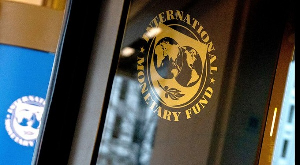By Samuel Hinneh
Courtesy: USAID Ghana Sustainable Fisheries Management Project Reporting Grant
The issue of a device to instantly determine chemicals contamination has become sensitive in the country, especially given the fact that majority of fishes arrive at shore harvested through unapproved means. Fish processors and fishermen alike definitely wholeheartedly welcome an initiative that can help identify these once brought to shore.
The minister in charge of fisheries and aquaculture development has indicated at a forum the acquisition of such device to aid women identify fish harvested through unapproved means and reject them when they are brought to shore or market. This would help to promote responsible fish harvesting in Ghana. But research has shown that there is none of such device on the market.
The stakeholders in the industry particularly women fish processors are eagerly waiting for this technology to be roll out, because pollutants in the marine environment, which can be organic and inorganic sources over the years, pose challenges to fish processors among others in the value chain.
Organic sources, such as faecal contamination in the form of bacteria, decomposing materials being either from wood or animal sources from dead animals get washed off into the marine environment. In addition, inorganic sources in the form of heavy materials, such as mercury, pesticides, or oil from oil stations and oil exploration activities and detergents from car wash could all go into the marine water to harm fishes.
Cornelius Adablah, National Project Coordinator of West Africa Regional Fisheries Programme at the Fisheries Commission says recognising the problem associated with fish contamination in the country, the ministry directed the head of the fish health unit to quickly run and investigate the issue.
"Upon investigation, it was discovered that there was very sporadic instances of fish contamination, it was not consistent and so the ministry quickly directed for a remedy and test kits were ordered and the women used it in catchment areas.
"They were trained in the use of such test kits, they deployed such test kits and once they realised there was a counter measure to the supply of such fish, the development ceased. The ministry had therefore opted for the use of fish test kits,” Mr Adablah states.
He said there is also a programme under the World Bank project to continue training women on fish health, as well as fish handling.
"There is a fish health unit at the fisheries commission at the ministry and this is their remit to ensure proper fish handling practices and use of devices including test kits in detecting the health state of fish supplied in the country.
"The ministry has gone into putting five health laboratories at vantage positions countrywide , first one was opened by the minister less than two months ago in Accra and is regarded as one of the best in Africa and there are four more to go to be built,” he says.
Grace Bondzie, a District President for the National Fish Processors and Traders Association (NAFPTA), Grace Bondzie, says as fish processors we have never seen fish test kit before, adding, "we were told by the minister that some will be given to us to see to identify fishes that are contaminated.”
"She said she would make provisions for us to have some but we are yet to get some. As part of NAPFTA, we recently went for a workshop and we were told some will come, western region fish processors and others have not had any device that can determine the presence of dynamite in fishes,” Bondzie said.
"Pollutants have an impact on fish. The fish obviously live in the water, eat and get into contact with these things either through feeding. For the organic aspect some of them are able to get degraded but for the inorganic ones don't degrade,” says Dr Denis Aheto, Head, Department of Fisheries and Aquatic Sciences at University of Cape Coast (UCC) and Project Director of the USAID Ghana/UCC Fisheries and Coastal Management Project.
"As time goes on it remains in the system through bioaccumulation and over time gets accumulated and other organisms feeds on it and end up picking it up and in the end if we catch those fishes and eat them it becomes sources of cancers,” he adds.
According to him it is a big problem, and explains that, "so if we want to do testing, it depends on what we want to test, either to test for bacteria or fungal infection or test for viral infections and other forms things such as physical and chemical parameters, Polycyclic aromatic hydrocarbons (PAH) or pesticides. For some of these there are snapshots application where you can easily test and get the information.”
Dr Aheto states that "PAH you can easily do it, there are sensors and handheld devices you can use to test for physical and chemical parameters. But things to do with heavy metals or pesticides, I have not as yet come across rapid assessment tools, these are more rigorous lab work that requires heavy equipment. Even here at UCC we don't have the equipment to estimate heavy metals, let alone a fishmonger.”
Dr Aheto notes that he is yet to come across rapid assessment of protocol to test chemicals in fish, but adds that "in any case I am not saying it is not possible, it can be developed, once you challenge the scientists to do that, they can do it. Even at UCC if you put the experts together to come up with protocols to estimate heavy metals or pesticides it can be done.”
He points out that training one or two of fishmongers or fish processors to manage the system can be done but ideally it can provide some kind of challenge and can be misused or abuse. "We need certified laboratory to tell us what the state of the fish and not to leave it to the ordinary man to tell us what is happening,” he adds.
Dr Aheto said UCC is in the process of establishing a laboratory equipped with state of art equipment such as to support research in relation to fish contamination.
Mr Sam Quaatey, Director of the Fisheries Commission mentioned that: "In fact we brought in the formalin test kits and the fish health unit do monitoring of the health status of fishes, they buy the fish at selected landing sites and if you compare outcry initially and now, there have been reduction in this issue.
"Secondly it is illegal to do that and through the initiative of minister, we have formed an association of national fish processors and traders association and the project is giving them capacity building. We intend to equip them with some of the fish test kit, in fact the last evaluation we did for fish harvest and post-harvest test kit was part of it, so occasionally we have been monitoring the issue and educating them on how to detect spoils fish, and is under control, ” Mr Quaatey said.
The Dean of the School of Physical Sciences, UCC, Prof David K. Essumang also says test kits are developed for specific chemicals, so to say that there is a test kits for fish that is too broad.
"We usually develop test kits for specific chemicals, so that the test kits are able to pick those chemicals of concern and that what test kits are all about.
"So if we want to train the fish mongers to use these test kits to test for DDT when fish is brought from the sea, they may have to go through some laboratory training, where they can extract the DDT and go along with the test to be sure that the DDT is present.
"Indeed it will be good if we have certain kits that can help fish mongers to detect at first hand if there is contamination in the fish so that they don’t process them at all but need further work and support before we can archive what we are looking for,” he says.
The Minister for Fisheries and Aquaculture Development, Ms Sherry Ayittey says every fish smoker cannot be given a fish test kit.
"We brought some when there was crisis and that stabilised it. We are training the women in how to handle fish and then also importantly we also have fish health unit at the ministry and also at the district and zonal levels. Any fish processor or fish monger who feels that she suspects that the fish is not in good quality can invite the extension officer to inspect the fish and advise them.
"In addition, in order to improve, we are building five fish laboratories because sometimes you must identify the particular bacteria and that has to go through laboratory and these five laboratories will be five vantage, in Greater Accra, Central, Western, Northern and Ashanti regions. We are also collaborating with the universities of Cape Coast, and University of Ghana on this project.
"The women have gone through several workshops to identify causes that contaminate fish. The open defecating at the beach by people consistently poses problems to fishes in the country. We also advise them to dry the fish on shelves and not directly on the ground to avoid any sort of contamination.
"We have also urged women to send complaints to the ministry or districts and zonal offices on fish contamination for testing at laboratories, and we can also send fish health unit to inspect the fish and advise them.
"We also buying the mobile fish laboratory, we are bringing in two and will arrive any time from now. That one when we get a call, they can drive to the location because it is equipped mobile laboratory and can do all the laboratory test and assist the women,” the minister notes.
Opinions of Saturday, 29 October 2016
Columnist: Hinneh, Samuel














